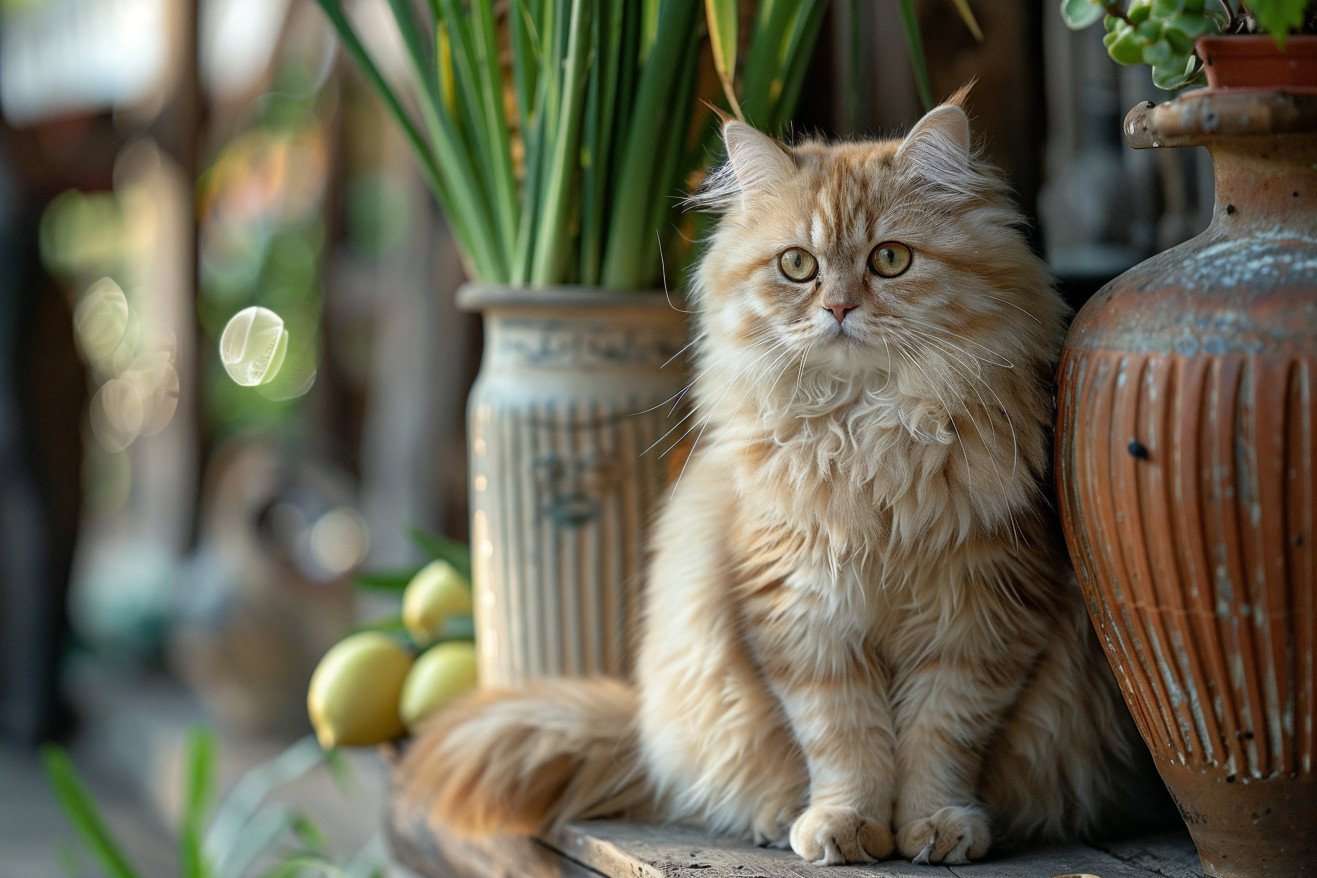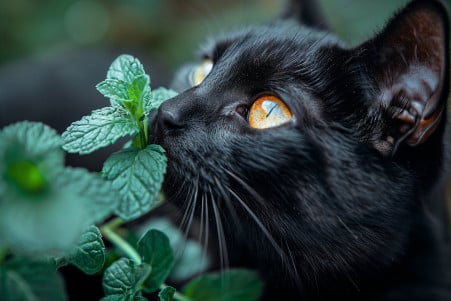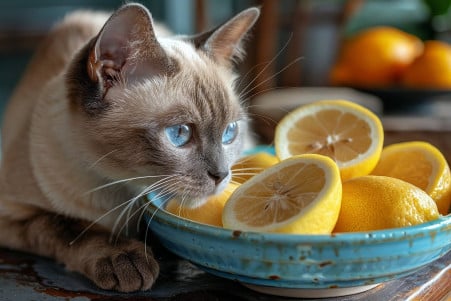Can Cats Eat Lemongrass? An In-Depth Investigation
30 March 2024 • Updated 29 March 2024

If you’ve ever had lemongrass in your home, you may have wondered whether it’s safe for your cat to eat or even just be around. While the lemongrass plant itself is not poisonous to cats, the oils in lemongrass can cause digestive upset, including vomiting and diarrhea, if ingested in large quantities. Therefore, it’s best to keep lemongrass plants in a place where cats can’t get to them and avoid using lemongrass oil around cats, as the smell may also repel some cats and lead to them avoiding areas where it’s present.
Even though lemongrass isn’t poisonous to cats, it’s still important to be careful when it comes to this fragrant plant. In this article, we’ll investigate the potential effects of lemongrass on cats by reviewing veterinary research and feline nutrition information. From its impact on cats’ digestion to its effect on their behavior, this evidence-based investigation will give you the information you need to make sure you and your cat can coexist in a lemongrass-filled home.
Is lemongrass safe for cats to eat?
Signs and Treatment of Lemongrass Poisoning in Cats
Common signs of lemongrass poisoning in cats include vomiting, diarrhea, drooling, loss of appetite, lack of coordination, and increased heart rate. In fact, as noted by Modern Vet, cats can suffer from intestinal blockages and liver damage after ingesting lemongrass because they lack the liver enzymes necessary to metabolize the compounds in lemongrass.
If you think your cat has eaten lemongrass, it’s important to call your vet or the ASPCA Animal Poison Control Center right away. According to VCA Animal Hospitals, treatment can include decontamination, such as inducing vomiting or giving activated charcoal to absorb the toxins. Your cat may also need to be given intravenous fluids for hydration and, in more serious cases, the digestive tract may need to be flushed or surgery may be required.
Although many cats can recover from lemongrass poisoning if they receive treatment quickly, the signs can be more severe depending on the amount of lemongrass that was ingested. That’s why it’s important to get your cat to the vet right away and to be ready to tell the vet exactly how much and what kind of lemongrass your cat was exposed to. With the right medical care, your cat can get past the effects of accidental lemongrass consumption.
Potential Uses and Risks of Lemongrass for Cats
Lemongrass offers a number of potential benefits to cat owners, based on studies of its effects, including its antibacterial, antifungal, and anti-parasitic properties, as well as its potential as an insect repellent and digestive aid.
Some pet-safe insect repellents, such as TREK by Lemongrass Farms, are made with lemongrass essential oils and are said to be safe for pets and pet owners when used as directed. However, lemongrass essential oil in its concentrated form should never be used on cats or in areas where cats can come into contact with it, as cats lack the enzymes needed to metabolize these substances.
While small amounts of lemongrass are likely safe for cats to eat, a strong desire for it could be a sign of an underlying health problem that needs to be evaluated by a veterinarian. If you're going to use lemongrass around cats, it's important to make sure you use it responsibly, which means keeping a close eye on your cat, diluting the oil properly, and giving your cat the option to avoid it.
How to Safely Use and Precautions of Lemongrass With Cats
Cats have a deficiency in their liver's glucuronyl transferase enzyme, which is responsible for breaking down and excreting certain compounds found in essential oils. This makes them more susceptible to potential toxicity from essential oils, including lemongrass, according to research by Rocky Mountain Oils. As a result, essential oils should be used with extreme caution and only under the supervision of a veterinarian.
Proper dilution, ensuring that cats can leave the area, and well-ventilated spaces are all important factors to consider when using essential oils around cats. According to AvoDerm, lemongrass hydrosols or non-alcoholic aromas can be used in low dilutions around cats, but they should never be ingested.
It's also important to watch for adverse reactions and to seek veterinary attention if you suspect your cat has ingested lemongrass, as pointed out by Meow Matics. Using lemongrass responsibly around cats requires mindfulness and a dedication to your cat's health and safety.
Safe Plants for Cats
There are many other plants, herbs, and grasses that are safe and non-toxic for cats to chew on or be around, which can help satisfy their natural urge to graze. Daily Paws lists some of the best options, including cat grass, catnip, silver vine, cat thyme, parsley, rosemary, and valerian.
In addition to cat grass, palms, spider plants, African violets, succulents, bamboo, ferns, and bromeliads are all non-toxic to cats and can be enjoyed by them, according to Purina. Meanwhile, calendula, cat's claw, chamomile, dandelion, and echinacea can be used to make tinctures and essential oils that may have health benefits for cats when used under the guidance of a veterinarian, says Litter-Robot.
By making sure that cats have access to safe plants and grasses, they can be deterred from eating potentially toxic plants like lemongrass, according to PrettyLitter. As a result, cat owners can ensure that they and their feline friends can live in a lemongrass-friendly home in peace.
How to Safely Use Lemongrass in a Cat-Friendly Home
Lemongrass is known to be mildly toxic to cats, and can cause digestive upset, including vomiting and diarrhea, if ingested in large amounts. This is particularly concerning for cats with pica, as they may be more likely to overconsume lemongrass.
The relationship between cats and lemongrass is a sensory one, and it’s important to take a multi-faceted approach to understanding how cats are impacted. While lemongrass essential oil is more dangerous because it’s more concentrated, there are precautions that can be taken to ensure that it can be used safely around cats.
Meanwhile, there are cat-friendly plants like catnip, wheatgrass, and spider plants that can help cats fulfill their need to chew without the risks that lemongrass poses. Responsible cat owners will monitor their cats around plants and consult with their vets as needed.
Final Thoughts: Delving Deep into Cats and Lemongrass Consumption
While lemongrass itself is not toxic to cats, its oils and concentrated forms can pose potential risks if ingested or exposed to in large amounts. Responsible cat owners should exercise caution when using lemongrass around their feline companions, following veterinary guidance and taking necessary precautions.
Providing cat-safe alternatives, such as non-toxic plants and grasses, can satisfy a cat's natural urges while ensuring their safety and well-being. With proper knowledge and care, it is possible to enjoy the benefits of lemongrass while maintaining a harmonious, lemongrass-friendly home for both you and your cat. Seeking prompt veterinary attention if lemongrass ingestion is suspected is crucial for the health and recovery of your feline friend.


